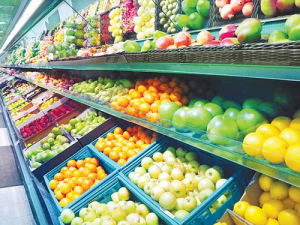The March Food Price Index shows another month of disruption to New Zealand’s fresh produce industry off the back of a challenging summer, says United Fresh.
According to Stats NZ, the food price index rose 12.1%, with fruit and vegetables up 22%.
United Fresh president Jerry Prendergast says the supply and demand model of the fresh produce industry means price fluctuations are unavoidable.
“Growing fresh fruit and vegetables is a complex and high pressure undertaking with a lot of variables,” Prendergast says. “Fruit and vegetables are exposed to the elements, that’s what gives out produce that delicious flavour and high nutrient level. But this also means we’re vulnerable to adverse weather.”
He says weather damage, like what has been seen over the past few months, means a reset of the whole growing process which takes three to four months for crops such as carrots, potatoes and cauliflower.
“If prices are high, that’s because demand is high, and stock is low – which is why we always advise shoppers to buy fresh fruit and vegetables that are in season. If you’re buying a summer favourite, such as tomatoes in late autumn, it’s going to cost more than it would in January.”
However, Prendergast says, the Food Price Index doesn’t tell the whole story of fruit and vegetable pricing.
He says the index uses a standardised ‘basket’ of goods.
“This doesn’t take into account the specials and seasonal pricing that are unique to the fruit and vegetable market,” he says. “Shoppers that take advantage of those seasonal prices will find their costs have not risen nearly as much as the Food Price Index would suggest.”
As growers clean up their orchards and replant, the fresh produce market will soon see a return to regular trading conditions, but Prendergast warns that long-term challenges remain.
“Like every other industry, we’re still battling the high costs of fuel and fertiliser and the shortage of labour,” he says.
“While everyone is looking hard at cutting costs as much as possible, we can’t avoid passing some of that expense on.”











